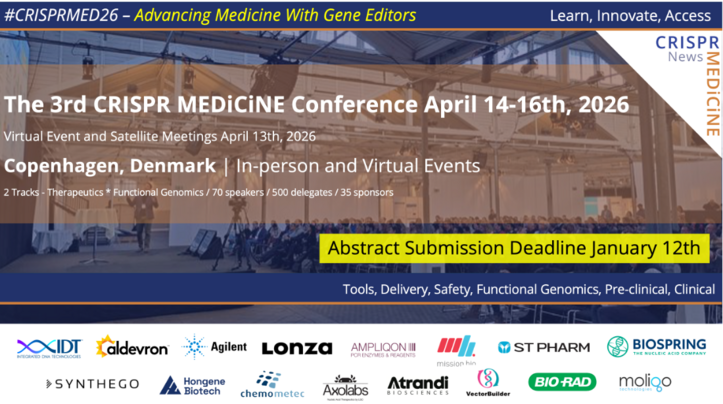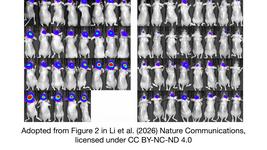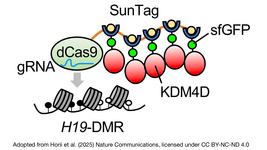CMN Weekly (16 September 2022) - Your Weekly CRISPR Medicine News
By: Gorm Palmgren - Sep. 16, 2022
CMN Intelligence - The World’s Most Comprehensive Intelligence Platform for CRISPR-Genomic Medicine and Gene-Editing Clinical Development
Providing market intelligence, data infrastructure, analytics, and reporting services for the global gene-editing sector. Read more...
Top picks
- After Cas9-induced DNA double-strand breaks (DSB), a competition is initiated between end-joining, single-strand annealing and homologous recombination. American researchers achieved the results with three fluorescent Cas9-based reporters, named DSB-Spectrum, that simultaneously quantify the contribution of multiple DNA repair pathways at a DSB.
- Japanese researchers show that neural stem cells derived from CRISPR-Cas9-edited human-induced pluripotent stem cells expressing a suicide gene had higher tumour-trophic migratory capacity than mesenchymal stem cells, leading to marked in vivo antitumor effects. The results indicate the potential benefit of genome-edited iPS cells based gene therapy for invasive glioma stem cells.
Research
- An Indian study finds, surprisingly, that the binding properties of Cas9 allow the enzyme to find and bind its target DNA with 90 ± 20% efficiency at temperatures as low as 4°C. The authors also find that the cleaved DNA products remain firmly bound to the Cas9 enzyme and are released from the enzyme only at higher temperatures.
- Researchers in Columbia have validated a CRISPR-Cas9-based gene editing strategy that relies on a Cas9 nickase (nCas9) as a potential approach for treating GM2 gangliosidoses using in vitro models for Tay–Sachs and Sandhoff variant diseases. The results also demonstrate the superior performance of non-viral vectors in enhancing the potency of this therapeutic approach.
- A comparative analysis of CRISPR off-target activity discovery tools following ex vivo editing of CD34+ hematopoietic stem and progenitor cells has been performed by American researchers. The paper that has not yet been peer-reviewed compares publicly available in silico tools (COSMID, CCTop, and Cas-OFFinder) and empirical methods (CHANGE-Seq, CIRCLE-Seq, DISCOVER-Seq, GUIDE-Seq, and SITE-Seq).
Industry
- Sigma-Aldrich and genOway, a preclinical research model space company, have added a new structure to their 2018 strategic alliance in the CRISPR-Cas9 field. According to the agreement, genOway will continue leading the commercialisation of the Sigma-Aldrich CRISPR patent portfolio in the field of rodent animals.
- Arbor Biotechnologies has been named one of Fierce Biotech’s "Fierce 15" companies of 2022. The Fierce 15 celebrates the spirit of being "fierce" - championing innovation and creativity, even in the face of intense competition.
- Locus Biosciences has announced that the ELIMINATE trial has begun enrolling patients, and the first patient has been treated. ELIMINATE is a registration-enabling Phase 2/3 clinical trial of lead candidate LBP-EC01, a CRISPR-enhanced bacteriophage precision medicine, for treating urinary tract infections caused by E. coli.
- Excision BioTherapeutics has announced initial findings indicating EBT-101 has been well tolerated to date in the first patient who was dosed in July 2022. EBT-101 is tested in a Phase 1/2 clinical trial for human immunodeficiency virus type 1 (HIV-1).
Detection
- Chinese researchers have created a generic check station termed "CRISPR-FET" for accelerated and unamplified detection of viral RNA. The detection system utilises a tandem Cas13a/crRNA-mediated CRISPR-field-effect transistor (FET) biosensor that sets a new world record in sensitivity for direct viral gene sensing with a detection limit down to 1.56 aM.
Reviews
- Researchers in India have reviewed lipid-based nanocarrier-mediated CRISPR-Cas9 delivery for cancer therapy. The design and genome editing application in cancer therapy is discussed, along with the future concern and prospects of lipid nanoparticle-based CRISPR-Cas9.
- American researchers discuss the mechanisms and applications of various gene-editing technologies for treating multiple inherited retinal diseases (IRDs). Technologies include adeno-associated virus vectors, lentiviruses, CRISPR/Cas9 systems, base and prime editing, antisense oligonucleotides, short-hairpin RNAs, Cas13, and adenosine deaminase acting on RNA. Also discussed are the various stages of clinical trials using these technologies and the impacts they have made in advancing the practice of medicine.
- A review by Indian researchers looks into the usefulness of the CRISPR-Cas technology against various lung cancers. Particular emphasis is laid upon how to tackle drug-resistant lung cancers responsible for many cases of failure and relapse of lung cancer.
- Jennifer Doudna is co-authoring a review about treating genetic diseases with CRISPR genome editing. The study discusses the basics of CRISPR, including DNA repair, indel formation, gene disruption, sequence insertions and the challenge of controlling the exact editing outcome.
Meetings and webinars
- On Wednesday, 21 September, CRISPR Medicine News is hosting a webinar entitled "Gene Editing for Rare Skin Disorder Junctional Epidermolysis Bullosa" by Dr Johannes Bischof from University Hospital of the Paracelsus Medical University Salzburg, Austria. The webinar is free to attend, and you can sign up here. You can also read our recent interview with Dr Johannes Bischof.
- The 1st edition of the CRISPR Screening in Cancer Discovery meeting will be held on Monday, 26 September 2022, at the Palais du Pharo in Marseille. You can still sign up to attend and even present a poster. Read the preliminary program and check out the conference's website to find out how to sign up.
Opinion and comments
- Have you ever wondered how CRISPR could change dentistry? Then read this piece in Dental Hygiene that suggests using CRISPR to treat oral cancer, inhibit plaque formation, and reduction/prevention of dental caries and periodontal disease.
- CRISPR pioneer Jennifer Doudna has received the inaugural Kimberly Prize in Biochemistry and Molecular Genetics for $250,000. Doudna was selected for her fundamental biochemical studies providing molecular insight into the function of CRISPR-Cas9 systems as tools for genome editing and applying her work to biology and medicine.
To get more of the CRISPR Medicine News delivered to your inbox, sign up to the free weekly CMN Newsletter here.
Tags
CLINICAL TRIALS
IND Enabling
Phase I
Phase II
Phase III
Gastric Cancer and Colorectal Cancer, CRC, (NCT07166263)
Sponsors:
Base Therapeutics (Shanghai) Co., Ltd.
Sponsors:
Base Therapeutics (Shanghai) Co., Ltd.
IND Enabling
Phase I
Phase II
Phase III
Relapsed or Refractory Acute Myeloid Leukemia, AML, (NCT06541444)
Sponsors:
Base Therapeutics (Shanghai) Co., Ltd.
Sponsors:
Base Therapeutics (Shanghai) Co., Ltd.
IND Enabling
Phase I
Phase II
Phase III







